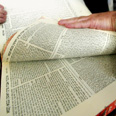

According to the plain – but not entirely clear - meaning of the story, it would appear that God’s fears cannot be judged by human standards.
The Bible tells us that the people of that generation joined together as a single community, speaking a single language, and united in their views – “the same words” (Genesis 11:1). They decided to build a tower that, according to the medieval biblical commentator Rabbi David Kimchi (Radak), was intended as a point of reference, so that every person could identify his home.
Why, then, would God wish to frustrate this society’s beautifully naïve plans? What would cause God to say: “If, as one people with one language for all, this is how they have begun to act, then nothing that they may propose to do will be out of their reach”? What is wrong with people realizing their goals?
God's reactions
Last Shabbat, we saw God’s reaction to eating of the fruit of the Tree of Knowledge. That reaction is not unlike what we just read: “Now that the man has become like one of us, knowing good and bad, what if he should stretch out his hand and take also from the tree of life and eat, and live forever” (Genesis 3:22).
Medieval commentators – like the Sages before them – sensed the inherent difficulty, and suggested that the people of Babel intended to erect a great monument to rival God. In order to frustrate the idolatrous intention of a united humanity, God had to intervene to disrupt this historic union, unique in the history of the human race.
Some commentators were unwilling to “succumb” to an explanation that did not reflect the text, and made heroic attempts to explain God’s action.
Generations' gap
The 16th century scholar Rabbi Eliezer ben Elijah Ashkenazi the Physician brought a rationalist approach to the subject. He raised a question posed by the midrash: Why was the Generation of Dispersion treated differently than the Generation of the Flood, which was entirely destroyed?
His answer was that the Generation of Dispersion learned the lesson of history. It understood what became of the generation described by the words “the earth became corrupt,” and sought to establish a unified political regime that would ensure society’s continued existence.
The difference between the two generations was expressed in their fundamental beliefs. The Generation of the Flood believed that “the world always existed, and there is no law or judge.” Therefore, it was an evil generation. While the Generation of Dispersion believed that “the world was created by the will of the Creator, and there is law and a judge, but He created the world of pre-existing matter.”
These differing views share a common denial of the idea that God alone created the world as an intentional act.
What about the tower?
But why destroy the tower? According to Ashkenazi, the tower was intended to be God’s seat – the seat of justice.
People were so unified in their opinions that they sought a single place that would express their fear of God and their need for law and a judge. They wanted to place God atop the tower, and worship him as something transcendent and unattainable. They accomplished this by building the tower with materials that represented creation from the pre-existing.
God cannot accept an absence of intellectual openness that is based upon a single, rational fundamental belief in the creation of the world from pre-existing matter.
According to Ashkenazi, the belief in creation as a miracle-ex-nihilo sees the purpose of Creation as “imparting immortality to the human spirit, which can be achieved only through the knowledge of the One who created it from nothing and absolute void, for by this it will know some of God’s greatness, ability, and concern.
"Therefore, God frustrated the plans of the Generation of Dispersion, so that what would happen after the destruction of the tower is that argument between people would clarify the truth.”
The Tower of Babel was not toppled as a punishment for idolatry, but in order to prevent intellectual stagnation and dogmatism. The message of the fall of the Tower of Babel is in the resulting multitude of languages, and multiplicity of opinions.
It is the message of searching for the truth by every means, of the daily renewal of the human intellect, and of the intellectual strength to accept that we may be wrong and need to look elsewhere.
Only a perspective of creation-ex-nihilo can lead to non-dogmatic thought. It expresses the belief in the miraculous, in the possibility for constant renewal, even when it is neither apparent nor rational. As Ashkenazi points out in regard to Abraham, whose story follows that of the Tower of Babel:
“…it would be farfetched for a person to rise up and defy a convention accepted by all the members of society. That is why God frustrated their plans. Because when one person takes this view, and one person takes another, the truth will result from the dispute, as even Abraham knew his creator because there were sun worshippers and moon worshippers and idol worshippers, and he came to disagree with each of them until he was ultimately dissatisfied with all, and he found his creator.”
The truth can be discovered only in a society that allows the freedom to consider a broad spectrum of opinions. Only exposure to a variety of opinions can lead to a new idea on the path to the truth.
Askenazi’s commentary teaches us an important lesson. Daily renewal, and constant questioning and examination are cornerstones of Creation and of the concept of creatio ex nihilo. The builders of the Tower of Babel were dispersed in the service of a principle that we continue to fight for to this very day – the principle of pluralism. Only true pluralism can help us discover the truth.
Torah roundtable
Why didn’t Noah pray to avert the Flood?
Since the Bible tells us that Noah was righteous and blameless, and since he found favor in God’s eyes, why did he not pray for the people of his generation and return them to the path of goodness, as we found in regard to Abraham our patriarch, who prayed that God not destroy the people of Sodom, who were utterly evil, as soon as God told him what was to befall them?
He said: “Here I venture to speak to my Lord,” and he added: “Let not my Lord be angry.” For it is the custom of the ancestors and the prophets to stand before God and pray to Him on behalf of the people of their generation, and so should all the leaders of a generation pray for their generation.
And the answer is that Noah did not refrain from praying for them in defiance or improperly, but because he knew that the existence of the world depended upon there being ten (righteous people), as the Sages taught: “By ten sayings was the world created (Ethics of the Fathers 5:1).”
Had there been ten righteous people in that generation, God would not have brought the Flood, because the world would have been preserved for them. But there were only eight people in the ark: Noah, his wife and three sons, and their wives. Since they did not constitute ten, they were not worthy that the generation be saved on their behalf, and it was enough that Noah saved himself and his family. (From the Torah commentary of Bahya Ibn Paquda)
- Why didn’t Noah pray to save humanity?
- Why didn’t Noah try to influence the behavior of the people of his generation? And if he tried and gave up, was he worthy of being saved? Can a leader who loses faith in humanity serve as a role model?
- Does the comparison of Noah with the leaders of society strengthen or weaken our estimation of Noah?
- Why does Bahya Ibn Paquda suffice with the answer that there weren’t ten righteous people in the world?
- What can we learn from the Mishnaic verse: “By ten sayings was the world created”? What connection might there be between the ten sayings that enabled Creation, and ten righteous people whom Noah could not find?
- In what ways are Noah and Abraham comparable and how do they differ? Would Abraham have behaved as did Noah? Would Noah have acted as did Abraham?
- What is common to the Flood and the destruction of Sodom and Gomorrah?
Rabbi Zvi Graetz is the rabbi of Kehillat Shevet Achim, Gilo, Jerusalem. Courtesy of Schechter Rabbinical Seminary in the Schechter Institute of Jewish Studies















